How You Can Assist a Family Through Pediatric Mental Health Crises
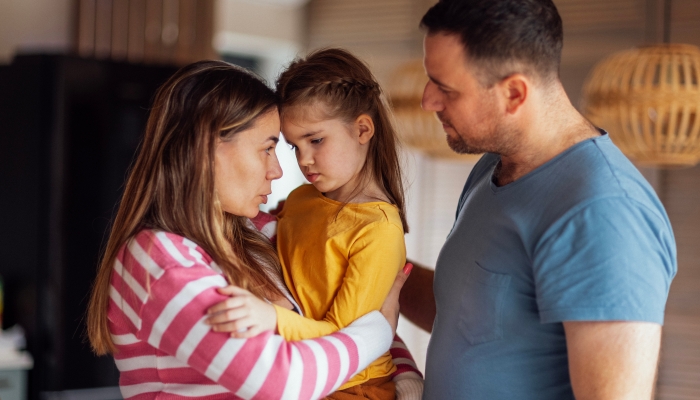
- Child and adolescent mental health is a national emergency.
- Symptoms of mental health problems may be vague or obvious.
- A behavioral health crisis can cause physical and emotional reactions in a responder.
- There are many ways you can physically and psychologically assist a family when they encounter a pediatric mental health crisis.
More people are utilizing the mental health care system than ever before. The effects of chronic stress or unanticipated life events, combined with new or chronic mental health conditions, can strain the coping abilities of even the most well-adjusted individual.
Friends and family members are some of the first people to become involved in crisis care during emergencies. Because mental health challenges can—and do—happen at all hours of the day and night, having supportive adults who know how to offer practical help is an important asset.
Maybe you’ve walked with an adult friend or loved one through a behavioral health crisis. But what does it look like to go through that experience with a child?
Whether you’re asked to engage as a background support person or hold a more central role, there are some key ways to assist a family you love as they work through a mental health crisis with their child.
Recognizing a Mental Health Crisis
For many child and adolescent mental health practitioners, it’s no surprise that our young people are experiencing behavioral health conditions and crises on an alarming scale.
In October 2021, three prominent organizations—the American Academy of Child and Adolescent Psychiatry (AACAP), the American Academy of Pediatrics (AAP), and the Children’s Hospital Association (CHA)—declared a national emergency11. AACAP Calls on Administration: Declare Children’s Mental Health Crisis a Public Health Emergency. AACAP. 2022. https://www.aacap.org/aacap/zLatest_News/SOTU_2022.aspx#:~:text=AACAP%2C%20the%20American%20Academy%20of,national%20public%20health%20emergency%20declaration. in children’s mental health.
These concerns have also been echoed over the past decade by the Centers for Disease Control and Prevention22. Children’s Mental Health: Understanding an Ongoing Public Health Concern. Centers for Disease Control and Prevention. 2023. https://www.cdc.gov/childrensmentalhealth/features/understanding-public-health-concern.html (CDC) and, more recently, in a joint statement33. AAP, ACEP, and ENA Publish Joint Policy Statement on Pediatric Mental and Behavioral Health Emergencies. Emergency Medical Services for Children Innovation and Improvement Center (EIIC). 2023. https://emscimprovement.center/news/aap-acep-and-ena-publish-joint-policy-statement-on-pediatric-mental-and-behavioral-health-emergencies from the American College of Emergency Physicians (ACEP) and the Emergency Nurses Association (ENA) in August 2023.
What’s causing our kids to have such a need for the mental health system?
Causes
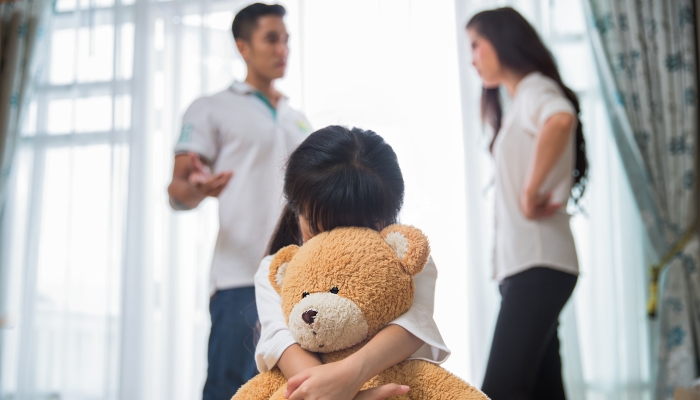
According to Dr. Warren Ng from the American Academy of Child and Adolescent Psychiatry (AACAP), establishing and equipping behavioral health services to address the mental health needs of children and adolescents is a key initiative.
Mental health workers and clinicians at AACAP report that young people may experience unique causes of psychological and emotional stress44. Stress Management and Teens. AACAP. 2019. https://www.aacap.org/AACAP/Families_and_Youth/Facts_for_Families/FFF-Guide/Helping-Teenagers-With-Stress-066.aspx#:~:text=Problems%20with%20friends%20and%2For,severe%20problems%20in%20the%20family that can place them at higher risk for developing a mental health crisis. These include:
- Demands and frustrations from peers or teachers during the school day
- Social isolation or loneliness
- Poor self-concept or persistent negative thoughts about themselves
- Physical and hormonal changes
- Unstable or unsafe housing, living environment, or neighborhood
- Separation or divorce of parents
- Long-term illness of a close family member
- Severe emotional or behavioral problems of a close family member
- Persistent, severe problems in the family (such as abuse, neglect, or witnessing abuse)
- Death of a loved one
- Relocating or changing schools
- Having too many extracurricular activities that prohibit opportunities for rest
- Unrealistic self-expectations
- Financial problems within the family
- Experiences of discrimination or structural racism
- Unaddressed or untreated behavioral health conditions like anxiety, depression, bipolar disorder, oppositional defiant disorder (ODD), or borderline personality disorder (BPD)
- Bullying
In a 2023 article55. Abrams, Z.. Kids’ mental health is in crisis. Here’s what psychologists are doing to help. American Psychological Association. 2023. https://www.apa.org/monitor/2023/01/trends-improving-youth-mental-health on the pediatric mental health crisis from the American Psychological Association (APA), psychologist Dr. Kimberly Hoagwood reports that prolonged, unrelenting stress in a child’s life can trigger a cycle of emotional and regulation problems, which can usher in a variety of behavioral health conditions and manifest as a mental health crisis.
Warning Signs

Children, adolescents, and young adults in need of mental health care may not show what many would consider “typical” symptoms, such as excessive crying or depressed mood.
Providers from the American Psychological Association (APA)66. How to help in an emotional crisis. American Psychological Association. 2013. https://www.apa.org/topics/mental-health/help-emotional-crisis note these vague, yet concerning, warning signs may include:
- Decline in personal hygiene
- Dramatic increases or changes in sleep habits, such as sleeping more often or consistently not sleeping well
- Weight gain or loss
- Decreased performance at work or school
- Sudden, pronounced changes in mood, such as irritability, anger, anxiety, or sadness
- Withdrawing from established activities and relationships
Clinicians from the APA encourage those who notice these behavioral health concerns to talk to their child or young adult sooner rather than later.
By gaining access to mental health support early, the hope is to avoid psychiatric emergencies and a full mental health crisis.
Immediate Warning Signs

Experts from the National Alliance on Mental Illness 77. What to Do If Your Child Is in Crisis. NAMI. https://www.nami.org/Your-Journey/Kids-Teens-and-Young-Adults/Kids/What-to-Do-If-Your-Child-Is-in-Crisis (NAMI) encourage parents to seek immediate emergency care if their young adult or child is experiencing any of the following:
- Active suicidal behavior
- Actual or suspected suicide attempts
- Expression of suicidal thoughts; these may be direct, such as “I want to die” or less obvious, such as “I don’t want to do this or be here anymore”
- Threatens to harm themselves or others
- Performing acts of self-harm, such as cutting or burning
- Severe agitation and/or aggression, such as acting out physically, intimidation, destruction of property, etc.
- Expressing hallucinations or delusions
- Self-isolating from friends and family
If you suspect a young person you love is experiencing an active pediatric mental health crisis, you must seek mental health treatment and services without delay.
Responding to a Mental Health Crisis
When asked to assist a family and their child who has mental health concerns, you may experience unexpected physical and emotional reactions.
Physical Response

It’s important to know that the sensations you feel in your body as a response to stressors are real, valid, and normal.
When a physical or mental health crisis occurs, the human body releases a whopping dose of adrenaline and stress chemicals designed to help the host survive the event.
This rapid rush of hormones may cause physical sensations88. What Happens to Your Body During the Fight-or-Flight Response? Cleveland Clinic. 2019. https://health.clevelandclinic.org/what-happens-to-your-body-during-the-fight-or-flight-response like:
- Increased heart rate and blood pressure
- Faster, shallow breathing
- Pale or flushed skin
- Muscle tension
- “Butterflies” in your stomach
- Feeling dizzy, tense, or jittery
Whether you’re the person experiencing a behavioral health crisis or assisting someone who is, the body’s goal is the same—equipping the host with what it perceives it needs to live.
Emotional Response

Psychological and emotional responses experienced during a crisis event can include:
- A heightened sense of danger
- Hypervigilance or hyper-awareness of surroundings
- Increased thought-processing speed
- Automatic scanning for available escape routes
Recognize that even being asked to respond to a crisis that hasn’t yet occurred can trigger physical symptoms and feelings of anxiety or fear. Such emotions are a normal response to a stressful event—actual or potential.
Immediate Steps to Take During a Crisis
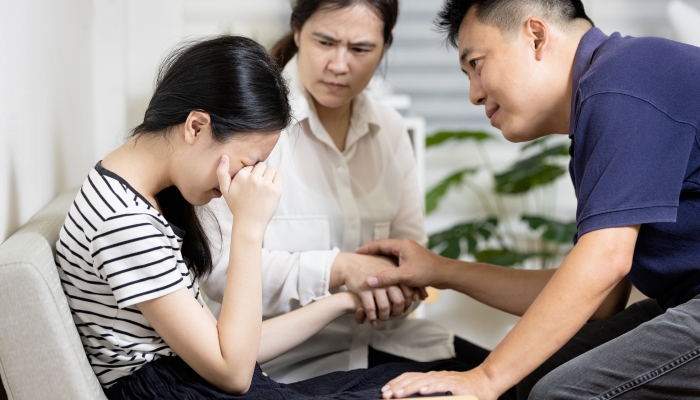
In an emergency, it’s hard to know what to do in what order. Everything seems to have equal priority or feels like it’s happening too fast.
Remember that it’s hard to help others during a crisis if you, too, are overwhelmed.
Take a deep breath and proceed with assisting the family you love in any of the following ways.
Safety First
If a child is experiencing a mental health emergency and the person managing the crisis feels they have enough support, it’s a good idea to do a quick check of the surrounding area. Are other children or vulnerable family members present?
If so, remove them from the situation and stay with them while the crisis deescalates.
Having other family members witness a behavioral health crisis for their loved one may put them directly in harm’s way. It can also cause vicarious trauma99. Tate, A. E., Sahlin, H., Liu, S., Lu, Y., Lundström, S., Larsson, H., Lichtenstein, P., & Kuja-Halkola, R.. Borderline personality disorder: associations with psychiatric disorders, somatic illnesses, trauma, and adverse behaviors. Molecular Psychiatry. 2022;27(5), 2514–2521. https://doi.org/10.1038/s41380-022-01503-z that may create mental health issues for these individuals.
Crisis Intervention Techniques
Experts at the American Association of Suicidology1010. Lsherman. How to help someone having a mental health crisis. American Association of Suicidology. 2023. https://suicidology.org/2023/04/10/how-to-help-someone-having-a-mental-health-crisis suggest the following techniques when working to de-escalate a mental health crisis.
Assess the situation:
Take a minute to determine what’s happening in the situation. Is it physically safe for you to enter? If not, consider summoning emergency service personnel to help protect the young person in crisis and others before engaging yourself.
If the young person is actively threatening to hurt themselves, start by removing potential self-harm tools like car keys, knives, sharp objects, medications, or firearms. Have someone stay with the child while you clear the immediate area.
Ask:
Calmly approach the person and ask them what they may be feeling or experiencing.
Consider that the person may be too overwhelmed emotionally to be able to verbalize what they feel.
In these instances, it may be helpful to start naming emotions like anger, sadness, or disappointment and asking the person to give a thumbs-up or thumbs-down if that feeling matches where they are.
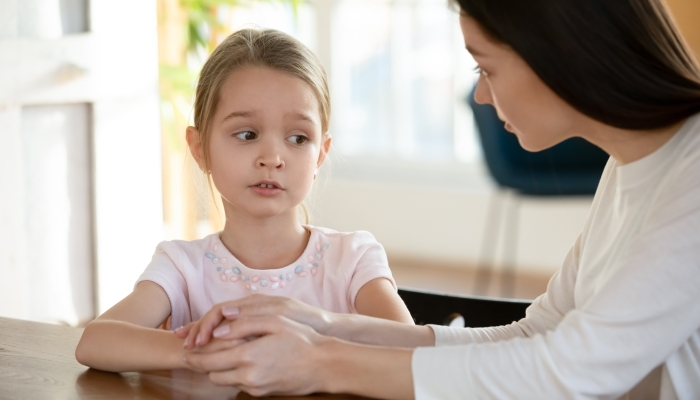
Listen compassionately:
In a high-risk, emotionally volatile situation like a mental health crisis, you may fear saying the wrong thing or “making a bad thing worse.”
Instead of trying to fix the problem, many mental health professionals suggest that responders focus on listening well, being present, and letting the person with the active issue know they’re there to help.
In my professional experience as a nurse, I’ve found it particularly helpful to respond with validating statements like “That makes sense” or “I can see how you’d feel that way.”
Whether or not you agree, the person in crisis is in no position to talk about the problem logically and needs your support far more than correction or a lecture.
Connect them with support:
If your child is already connected with a mental health provider, encourage them to contact that person. You can also reach out to that person if it feels too hard for the person in crisis to do at that moment.
If you need immediate contact with a mental health professional, you can text 9881111. 988 Suicide & Crisis Lifeline. 988 Lifeline. https://988lifeline.org (National Suicide Prevention Lifeline) or 7417411212. Text HOME to 741741 to connect with a volunteer Crisis Counselor. Crisis Text Line. https://www.crisistextline.org (NAMI crisis text line).
Both mental health services are free, staffed by crisis coordinators, and are available 24 hours a day, seven days a week.
Consider emergency services:
In addition to treating various medical conditions, the emergency department is also a helpful place to go when experiencing a psychiatric emergency.
In response to the growing rate of pediatric mental health concerns, many communities have developed dedicated mental health or psychiatric facilities—some of which are exclusive to children and adolescents.
These facilities may also have a psychiatric emergency room dedicated to treating children with a variety of behavioral health conditions.
Practice self-care:
Engaging in a mental health crisis can leave you physically and emotionally depleted, even if you didn’t serve in a primary role.
Making healthy food choices, increasing water intake, gentle physical exercise, and talking with trusted friends are all important ways to care for yourself after providing mental health support.
If you need additional resources, be sure to contact your primary care provider or mental health professional.
Communication Strategies to Use During a Crisis

Having done your best to ensure the safety of all involved, you’re now preparing to speak with a child you love who is struggling.
How can you use your words to reach them?
Check Your Emotions
When I’m preparing to make contact with someone who’s having a mental health emergency, I try to take a deep breath and visualize myself hitting a giant “pause” button on my emotional remote control.
It’s okay to be very worried and have strong feelings about what’s happening.
Allowing those feelings to lead the conversation and ramp up the struggling person, however, may not be a helpful choice for either of you.
By suspending personal feelings and putting on my best listening skills, I make myself emotionally available to respond to a person who needs my help.
Choose a Person
In my professional experience responding to folks who were having mental health emergencies, I’ve found it helpful to have one person at a time speak to the person in crisis. Others can be present nearby or actually in the room, but it helps to have a primary person whose role is communicating with the person with the mental health concern.
Having one person lead the de-escalation process gives the person experiencing the event a person on whom they can focus their attention and communication abilities.
This, in itself, can be a calming strategy.
Keep it Simple
When dealing with children and adolescents who are experiencing a pediatric mental health crisis, it’s helpful to speak in simple terms and avoid long explanations.
When in a heightened emotional state, the logic center is the brain goes “offline” and raw emotions, like fear and anger, are more likely to be the driving forces in communication.
Young people experiencing a mental health emergency usually don’t have access to higher brain functions, like decoding or verbal processing abilities, to process an excess of words.
Simple, clear, and compassionate communication is best in these situations.
When to Access Professional Help
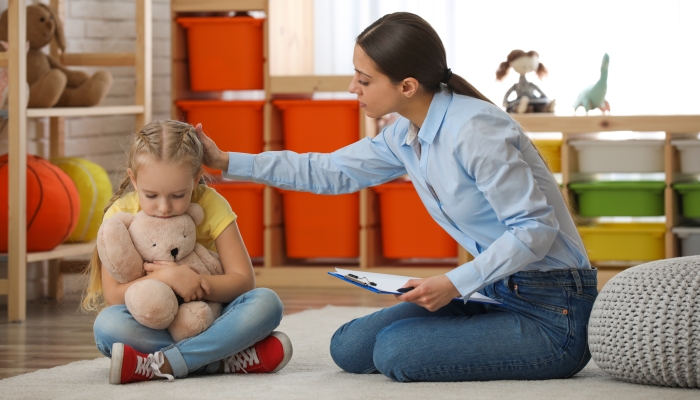
If you’ve done your best to engage with a struggling child and feel like the situation is continuing to escalate or you need more support, it may be time to engage the help of other professionals.
Accessing mental health services via your local emergency department is a good reason to visit the hospital. While specific child and adolescent psychiatry providers may or may not be available, all emergency medicine physicians have training in psychiatry and can help keep your child safe.
Emergency room personnel can conduct mental health assessments and work with you and your child to determine the most appropriate next steps.
The many unique social and emotional pressures children and adolescents experience may cause a mental health crisis. While it may be helpful, formal behavioral health training is not required to make a difference in assisting a child or their family through this experience.
References
- AACAP Calls on Administration: Declare Children’s Mental Health Crisis a Public Health Emergency. AACAP. (2022, March 1). https://www.aacap.org/aacap/zLatest_News/SOTU_2022.aspx#:~:text=AACAP%2C%20the%20American%20Academy%20of,national%20public%20health%20emergency%20declaration.
- Children’s Mental Health: Understanding an Ongoing Public Health Concern. Centers for Disease Control and Prevention. (2023, March 8). https://www.cdc.gov/childrensmentalhealth/features/understanding-public-health-concern.html
- AAP, ACEP, and ENA Publish Joint Policy Statement on Pediatric Mental and Behavioral Health Emergencies. Emergency Medical Services for Children Innovation and Improvement Center (EIIC). (2023, August 31). https://emscimprovement.center/news/aap-acep-and-ena-publish-joint-policy-statement-on-pediatric-mental-and-behavioral-health-emergencies
- Stress Management and Teens. AACAP. (2019, January). https://www.aacap.org/AACAP/Families_and_Youth/Facts_for_Families/FFF-Guide/Helping-Teenagers-With-Stress-066.aspx#:~:text=Problems%20with%20friends%20and%2For,severe%20problems%20in%20the%20family
- Abrams, Z. (2023, January 1). Kids’ mental health is in crisis. Here’s what psychologists are doing to help. American Psychological Association. https://www.apa.org/monitor/2023/01/trends-improving-youth-mental-health
- How to help in an emotional crisis. American Psychological Association. (2013). https://www.apa.org/topics/mental-health/help-emotional-crisis
- What to Do If Your Child Is in Crisis. NAMI. (n.d.). https://www.nami.org/Your-Journey/Kids-Teens-and-Young-Adults/Kids/What-to-Do-If-Your-Child-Is-in-Crisis
- What Happens to Your Body During the Fight-or-Flight Response? Cleveland Clinic. (2019, December 8). https://health.clevelandclinic.org/what-happens-to-your-body-during-the-fight-or-flight-response
- Tate, A. E., Sahlin, H., Liu, S., Lu, Y., Lundström, S., Larsson, H., Lichtenstein, P., & Kuja-Halkola, R. (2022). Borderline personality disorder: associations with psychiatric disorders, somatic illnesses, trauma, and adverse behaviors. Molecular Psychiatry, 27(5), 2514–2521. https://doi.org/10.1038/s41380-022-01503-z
- Lsherman. (2023, April 10). How to help someone having a mental health crisis. American Association of Suicidology. https://suicidology.org/2023/04/10/how-to-help-someone-having-a-mental-health-crisis
- 988 Suicide & Crisis Lifeline. 988 Lifeline. (n.d.). https://988lifeline.org
- Text HOME to 741741 to connect with a volunteer Crisis Counselor. Crisis Text Line. (n.d.). https://www.crisistextline.org
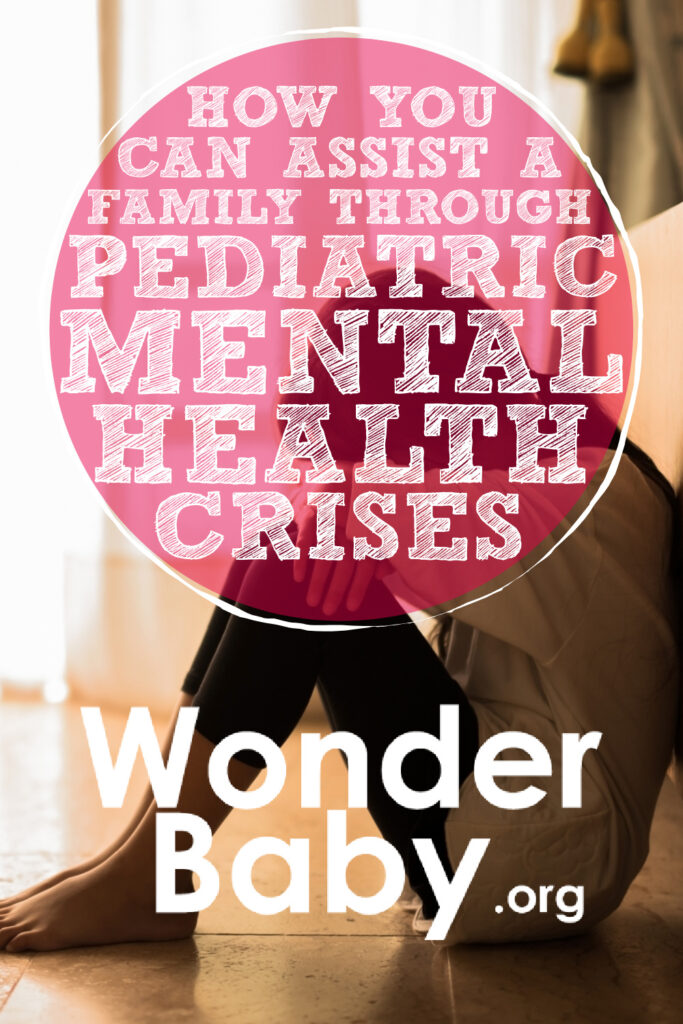
The information WonderBaby provides is not intended to be, and does not constitute, medical or other health advice or diagnosis and should not be used as such. Always consult with a qualified medical professional about your specific circumstances.
Related Posts

Eye Conditions and Syndromes, Visual Impairment
Neuralink Announces Plans to Restore Sight to the Blind with Brain Chip
Elon Musk’s company Neuralink has announced plans to begin human trials of its new “Blindsight” brain chip by the end of 2025.

Special Needs
5 Spring Cleaning Tips for Families of Children with Disabilities
Spring cleaning is an opportunity to create a more accessible, organized, and supportive space for your child with disabilities. Declutter, deep clean, and refresh!

Visual Impairment
The Gift of Understanding: How a Young Child Helps His Blind Father Navigate Life
When a parent is blind, it’s natural for people to wonder how their sighted child will adapt. Will they struggle to understand their parent’s needs? Will they feel burdened by...